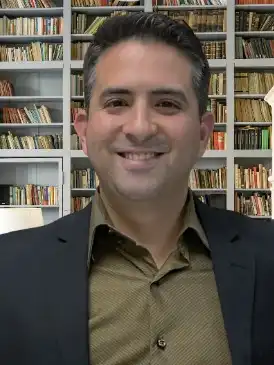
07 Jun, 2024 in History

Andres Sebastian Nava
Chief Administrative Officer,
Nexus Criminal Justice Institute
August Vollmer remains a seminal figure in law enforcement, whose pioneering work continues to shape contemporary policing practices. Although there are differing accounts regarding his birthplace—whether New Orleans in 1876 or Germany with subsequent emigration to the United States as a child—his influence is undeniable (Walker & Katz, 2011). Vollmer's law enforcement career began in earnest when he was appointed town marshal of Berkeley, California, in 1905, a role that set the stage for his future impact. He later became Berkeley’s first chief of police, where he implemented numerous groundbreaking reforms (Walker & Katz, 2011).
Widely recognized as the "father of modern policing," Vollmer earned this title through his innovative and forward-thinking approaches. His advocacy for education and rehabilitation over mere punishment introduced a transformative shift away from the punitive models predominant at the time (Vollmer, 1971). Furthermore, Vollmer was among the earliest to apply scientific methods to crime-solving, incorporating techniques such as fingerprinting and lie detector tests, which were revolutionary during his era (Roth, 2011).
This article delves into Vollmer's remarkable life, his significant contributions to law enforcement, and the enduring impact of his principles on modern policing. By examining Vollmer's legacy, we can better appreciate the evolution of law enforcement and continue to pursue its ongoing improvement.
The exact details of August Vollmer's birthplace remain a subject of debate, with some sources pointing to New Orleans, Louisiana (Wikipedia; Encyclopedia.com), while others suggest he might have immigrated as an infant. Regardless of this uncertainty, Vollmer's early life was undoubtedly rich with diverse experiences (Walker & Katz, 2011). He undertook various roles including firefighter, coal and feed store operator, military private, and mail carrier. These varied occupations likely equipped him with a wide array of skills and perspectives that profoundly influenced his later approach to policing.
Vollmer's entry into law enforcement leadership was somewhat unforeseen. In 1905, he was elected the first police chief of Berkeley, California, despite his initial intention to serve only a single term (Walker & Katz, 2011). This unexpected path ignited a lifelong dedication to policing. As chief, Vollmer adopted progressive principles, transforming Berkeley into a pioneering ground for his innovative strategies (Berkeley News, 2017).
His pioneering work earned Vollmer the title of "the father of modern-day law enforcement" (Study.com, n.d.). He was instrumental in introducing scientific investigation techniques in the United States, such as blood analysis, which became foundational to modern forensic science (Zhao et al., 2018). His influence extended beyond practical methodologies; during his tenure at the University of California, he penned significant works like "Crime and the State Police" (1935) and "The Police and Modern Society" (1936), thereby cementing his legacy in shaping the future of law enforcement (Rampersad, 2016).
A New Era in Policing: Vollmer's Appointment as Berkeley's First Police Chief
August Vollmer's leadership of the Berkeley Police Department represents a pivotal chapter in the history of American law enforcement. Although some sources assert his appointment as Berkeley's first police chief occurred on August 13, 1909 (Walker & Katz, 2011), it is essential to recognize that he had been serving as the elected town marshal since 1905 (Los Angeles Police Department Historical Society, 2021). Regardless of title specifics, Vollmer's leadership from 1905 onward inaugurated a progressive era for the department.
Vollmer's role extended beyond mere symbolism; he had the opportunity to construct the department's practices from the ground up (Goldfarb, 2017). Embracing innovative principles, he transformed Berkeley into a pioneering ground for forward-thinking policing methods (Berkeley News, 2017). Despite having limited formal education, Vollmer's visionary outlook was instrumental in professionalizing the police force, a concept that became central to the Reform Era in policing (Walker & Katz, 2011).
His tenure was distinguished by a series of groundbreaking reforms. Vollmer introduced mobile patrol units, implemented recall systems to enhance response times, and utilized beat analysis for strategic officer deployment (Walker & Katz, 2011). He also championed scientific detection methods, such as blood analysis, which laid the foundation for modern forensic science (Zhao et al., 2018). Another significant innovation during his leadership was centralized crime recordkeeping. These advancements, considered revolutionary at the time, have since become fundamental components of modern policing practices.
Overcoming Obstacles: Vollmer's Challenges as Chief of Berkeley Police Department
August Vollmer's tenure as Berkeley's police chief, while distinguished by pioneering reforms, faced significant challenges. Introducing his innovative practices in a department inherently resistant to change was no small feat (Walker & Katz, 2011). Concepts such as police call boxes and vehicle patrols, which are now standard, were revolutionary at the time. Persuading officers and city officials of their efficacy necessitated robust leadership and unwavering advocacy.
The implementation of community policing initiatives also encountered obstacles. Limited resources, a lack of prioritization by police leadership, and the frequent rotation of officers trained in these new practices posed significant barriers (Walker & Katz, 2011). Ensuring continuity and sustained commitment to these approaches proved particularly challenging.
Vollmer's advanced ideals were occasionally controversial. His advocacy for treating lawbreakers with respect and protecting them from abuse was not universally accepted in the early 20th century (SFGate.com, 2017). Additionally, recent revelations about his support for eugenics have cast a shadow over his legacy, prompting calls for the renaming of landmarks honoring him (East Bay Times, 2020).
Despite these challenges, Vollmer remained steadfast in his mission to reform policing. His groundbreaking work in Berkeley established the foundation for numerous modern police practices, ensuring his enduring influence on the field.
Pioneering Innovations: Vollmer's Impact on Policing
During August Vollmer's leadership in Berkeley, his series of pioneering reforms left an enduring influence on contemporary law enforcement practices. Among his most notable contributions was the introduction of mobile patrol units. Initially, officers used bicycles for patrolling, which later evolved into the adoption of automobiles, significantly enhancing the speed and efficiency of their response to service calls (KQED News, 2017).
Vollmer was a proponent of integrating technological advancements into policing. He implemented the use of call boxes, allowing officers to promptly request backup and report ongoing crimes, thus improving communication and coordination (Police1.com, 2021). Furthermore, he became the first police chief in the United States to advocate for the application of scientific methods such as blood, fiber, and soil analysis in criminal investigations, laying the foundation for modern forensic science (Berkeleyside.org, 2020).
His vision extended beyond technological innovations. Vollmer transformed police training by promoting the recruitment of college-educated officers (Encyclopedia.com, 2021). This emphasis on education and professional development remains a key element of modern law enforcement training (Lawaspect.com, 2023). Additionally, he established a code of ethics and eradicated the system of gratuities, thereby advancing the professionalization of the police force (Walker & Katz, 2011).
Despite facing resistance, Vollmer remained dedicated to his mission of creating a modern, efficient, and ethical police force. His pioneering spirit and innovative practices have made a lasting impact on law enforcement nationwide. August Vollmer is rightly recognized as a seminal figure in the evolution of modern policing.
Controversies and Criticisms: The Shadows in Vollmer’s Career
August Vollmer's legacy in law enforcement is multifaceted. While he is widely recognized for his significant contributions, his career was not without controversy. His innovative and progressive ideas often faced resistance, and some of his personal beliefs have been the subject of harsh criticism.
One major controversy involves Vollmer's endorsement of eugenics, a belief in improving the human population through selective breeding (Berkeleyside.org, 2020). It is important to acknowledge that eugenics was a prevalent ideology in the late 19th and early 20th centuries, supported by many prominent figures:
However, it is now widely condemned due to its association with discriminatory and unethical practices (Arizona State University, n.d.). Vollmer's support for eugenics casts a shadow over his legacy and raises questions about his broader social views.
Vollmer's perspectives on police use of force have also sparked debate. While he advocated for violence only as a last resort, some critics argue that his approach condoned its use in certain questionable situations (Miller, 2009). Contrastingly, his emphasis on rehabilitation faced resistance from those who favored harsher punishments (Walker & Katz, 2011).
Furthermore, Vollmer's push for college-educated officers was not universally embraced. Critics argued that practical experience should be prioritized over academic knowledge (Encyclopedia.com, 2021). Despite these controversies, Vollmer's impact on modern policing remains undeniable. His groundbreaking reforms continue to influence the field, solidifying his position as a key figure in the development of law enforcement. However, a comprehensive evaluation of his legacy must consider both his contributions and his shortcomings.
A Lasting Legacy: Vollmer's Impact on Modern Law Enforcement
August Vollmer's influence on modern law enforcement is substantial. His pioneering ideas, implemented during his tenure as police chief of Berkeley, California, continue to shape the practices of police departments globally. A 2020 survey by the Pew Research Center found that 80% of Americans believe police departments should require officers to have a college degree (Pew Research Center, 2020). This reflects the enduring impact of Vollmer's emphasis on professionalization through higher education.
His advocacy for using scientific methods in crime-solving has had a lasting impact on criminal investigations. Techniques such as fingerprinting, blood analysis, and lie detector tests, which were revolutionary in Vollmer's time, are now standard practice in law enforcement agencies worldwide (Berkeleyside.org, 2020). Nevertheless, debates regarding the effectiveness and limitations of some of these techniques, particularly lie detector tests, persist (National Academies of Sciences, Engineering, and Medicine, 2003).
In closing, while August Vollmer was very much a product of his era, his vision and innovations were remarkably forward-thinking. His legacy serves as a reminder of the transformative power of progressive thinking in law enforcement, and his contributions continue to shape the face of modern policing.